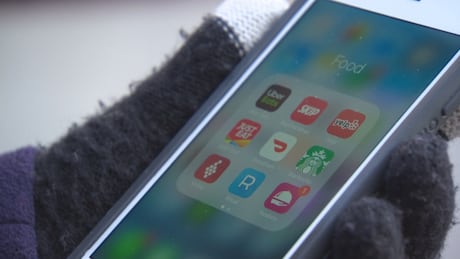Why saving money on food is 'definitely a challenge' for millennials
Convenience, abundance of food apps big reasons why some are overspending on meals
 |
| Seeking convenience, some time-starved millennials are finding themselves living paycheque to paycheque due to overspending on food (John Grierson/ CBC News) |
When Leslie Hacker began taking a closer look at her finances recently, she noticed she was spending about $1,000 on food each month.
"It seems like a lot, but when I did the math, that's about 35 dollars a day, which doesn't seem that crazy anymore to be honest," she says.
Eating out, ordering in. Throw in a bagel here, a coffee there, and it all adds up.
"It's definitely a challenge for people my age to save on food."
At 28, Hacker is a millennial, defined as anyone born between 1980 and 2000. Saving money is a problem for her generation and experts say a big reason is how much millennials spend on eating out and ordering in.
Hacker works in social media marketing, which makes it even harder, she says, to save on food.
"All day I'm seeing these food pictures online and I'm like, 'I want to try this and I want to try that!'" she tells CBC Toronto.
Leslie Hacker, a millennial foodie living in Toronto, says besides convenience, food apps like UberEats and SkipTheDishes allow her to try a wide range dishes from many great restaurants in the city. (Kelda Yuen/ CBC News)
In the age of smartphones, access is easier than ever with popular food apps like UberEats and SkipTheDishes bringing a hot meal to your door in minutes. But the convenience comes at a cost.
"There's the delivery fee — $5.00 to $7.50, I find, is the usual delivery charge. And then you have to tip the drivers."
Despite that, Hacker says she still uses the apps at least a few times a week because "as a single person, it's harder to cook, I find. There's less motivation. Maybe when I have a family, things will be different."
Paycheque to paycheque
Jessica Moorhouse, a Toronto-based millennial money expert is noticing many of her well-paid millennial clients are living from paycheque to paycheque because they are overspending on food.
Some, like Hacker, are spending $500 to $1,000 dollars a month.
"Most of the time when I'm talking to clients, I'm like, 'So you're spending $500 on eating out every month, are you happy with that?' and most of the time they are like, 'No! I wish I could use that money towards my emergency fund, paying off debt, or go on an amazing trip!"'
She says the first thing she tells her clients is to track their spending for three months to identify patterns and problem areas, then they can "start taking steps to fix it."
Moorhouse says there is no "right or wrong answer" when it comes to how much you should be spending on food, but "10 to 20 per cent of your gross income… is a good starting point."
Millennial money expert Jessica Moorhouse says many of her clients opt for the more expensive options of ordering in or dining out because they don't have time to go grocery shopping and cook. (John Grierson/ CBC News)
A millennial herself, Moorhouse, 32, says she definitely notices her generation is spending more money on food than their parents, but she understands why.
"I think it's because our lifestyles are very different. A lot of us are working full time and we have a side hustle, or we're busy on the weekends," she said.
"We're just go, go, go all the time. We're in that crunch time in our lives whereas Gen Xers and baby boomers, the kids may be out of the house (and) they've got a little bit more time."
No time to cook
"I feel like I'm always worried about not having time to cook," 21-year-old Parnian Dolati said.
As a full-time student, Dolati says she's often too busy for the kitchen.
"I should be spending the money on making my own food but I don't."
Richard Banyard, 32, is a millennial who does cook, and says it saves him a lot of money.
He told CBC Toronto he spends about $20 to $30 on food each week, which adds up to between $80 and $120 a month.
"It's the value of knowing how to make simple meals. I know people who don't even know how to cook an egg. [They] don't cook at all, so they spend most of their money on take-out."
Finding a middle ground
For time-starved millennials who don't have time to grocery shop or prepare food, Moorhouse suggests meal-kits as a good option to cut costs.
"That's where those kind of delivery service meal kits come in… They do the hard lifting for you. They have all the ingredients and all you have to do is put it together. If you have 15 or 30 minutes, which everyone does, you'll have time to make your own meal."
And the cost?
"It's way cheaper. For instance, with Chef's Plate (an Etobicoke-based meal kit company), a kit starts at $8.99 (including delivery). It's really good in terms of being a middle ground if you're looking for something to help you with your budget, eat healthy, and help you with those time constraints."
Hacker says she can't see herself deleting food apps as Moorhouse suggests. But she is looking for ways to save money, such as cooking more often and dining in or ordering from less expensive restaurants. (John Grierson/ CBC News)
Hacker says she opts for the meal kit option once in a while.
"I don't use it every week, but I find it helps."
She also says she is trying to cook something every other day in order to save money.
For those who really want to save though, Moorhouse suggests going cold turkey.
"Seriously, if you want to save money, delete those apps."











No comments:
Reviews On Below